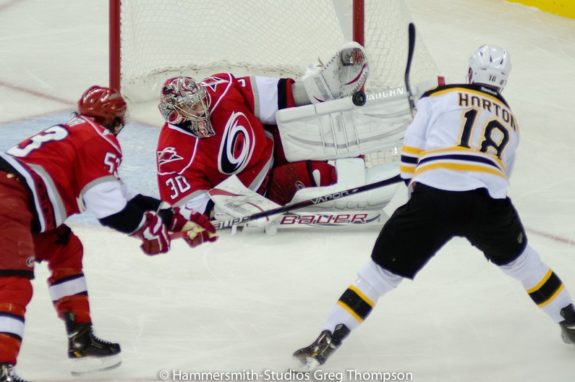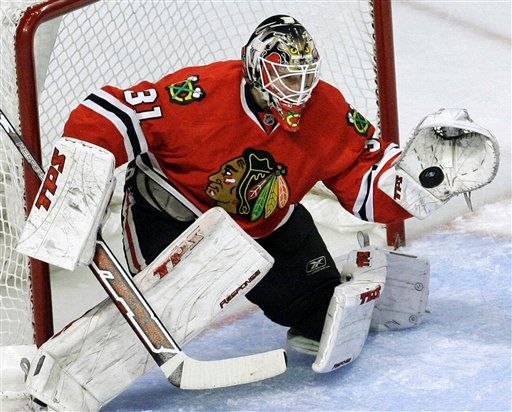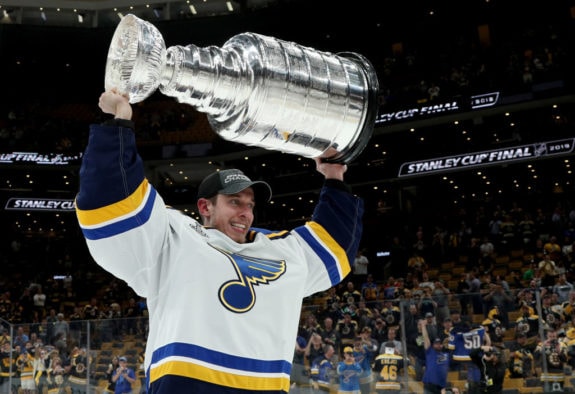No position is more heavily scrutinized heading into the Stanley Cup Playoffs than goaltending. Many mighty squads have met their demise over the years when their backstop turned into a backbreaker or the goalie at the other end of the ice transcended physics and logic with their jaw-dropping work. It’s often at the heart of the massive upsets that make playoff hockey so fun. No factor can single-handedly make or break a team quite like goaltending because, in the ultimate team sport, goaltending comes down to just one person.
But sometimes, teams change the person doing that work and find a spark. Just looking at the salary cap era, three teams went on to win the Stanley Cup with a goaltender who no one expected to lead them to glory earlier in the season, if not at the start of the playoffs.
Sign up for our NHL History Substack newsletter
With less than three weeks until this year’s tournament begins, let’s look back at those teams — and see if any others might join this group in the months to come. One caveat — this list will not include teams who changed goaltenders due to injury. So that’s why you don’t see Matt Murray and the 2016 Pittsburgh Penguins or Adin Hill and the 2023 Vegas Golden Knights included here.
2006 Carolina Hurricanes
The Incumbent: Martin Geber was in his third season in the NHL but first as a full-time starter after spending his first two NHL seasons as the backup for the Anaheim Ducks. His .906 save percentage (SV%) was the lowest of his career but was still top-20 among qualified goaltenders.
The Changing Point: The 112-point Carolina Hurricanes fell behind the 93-point Montreal Canadiens, with Gerber’s struggles being a major culprit. He allowed six goals on 27 shots in Game 1, then was yanked after allowing three goals on 16 shots in the first period of Game 2.
The New Guy: The Hurricanes went from a young goaltender in Gerber to an inexperienced one in rookie Cam Ward, who put up a ghastly .882 SV% during the regular season.
The Run: Ward played well enough in relief in Game 2 (23 saves on 26 shots) to earn the nod for Game 3, where he stood on his head, stopping 28 of 29 shots to secure a must-win victory. He gradually took off from there, allowing just four goals over the final three games of the series. He was pulled early in the second period of Game 4 in the next round, but his starting job was in little doubt after allowing four goals in the first three games of that series as well.

Gerber did get another chance to start in Game 4 of the Eastern Conference Final after Ward posted a sub-.890 SV% in his first three games against the Buffalo Sabres. Gerber earned another nod after a 22-save shutout evened the series, but wouldn’t play again after allowing three goals on 14 shots in just over 20 minutes of work. Ward played the entire Stanley Cup Final, including a shutout in Game 2 and a sparkling Game 7 performance in which he stopped 23 of 24 shots, helping the Hurricanes edge the Edmonton Oilers 3-1 to win the Cup. He earned the Conn Smythe Trophy for his efforts in Carolina’s run.
The Aftermath: Ward immediately became Carolina’s full-time starter for the next decade, largely providing solid play (career .909 SV% with the Hurricanes), although he never took the leap into elite status. Gerber left in free agency for the Ottawa Senators, backing up Ray Emery on the third Finals run of his career, then becoming the team’s starter the following season. He played well in 2007-08 but struggled afterward and was out of the league by 2011.
2010 Chicago Blackhawks
The Incumbent: Cristobal Huet had largely been a tandem goaltender throughout his seven-year NHL career, although he played a career-high 48 games in the 2009-10 regular season. That was his second year with the Chicago Blackhawks, and after taking a backseat to Nikolai Khabibulin in the playoffs the previous season, he looked like Chicago’s No. 1 for much of the year.
The Changing Point: Huet struggled down the stretch, recording a SV% no better than .870 in five of his final six appearances (and below .800 in two of his last three) as he dealt with the flu. That forced the Blackhawks to give their other goaltender an extended look, and he took advantage of his chance.
The New Guy: Antti Niemi was an undrafted free agent who was a solid 1B to Huet in his first full NHL season, notching a .912 SV% in 39 games. He allowed two goals or fewer in five of his last seven regular season games, earning him the starter’s role heading into the playoffs.

The Run: Niemi pitched two shutouts in Chicago’s opening-round win against the Nashville Predators, immediately showing his potential. His best performance in Round 2 came in a Game 6 series-clincher, as he turned away 30 of 31 shots the Vancouver Canucks sent his way. The San Jose Sharks only managed seven goals against him in a Western Conference Final sweep, and although he struggled a bit in the Final (Game 2 was the only contest in which he had a SV% above .900), the rookie wasn’t the goaltender in the series who let in the agonizing series-winner from a bad angle in overtime.
The Aftermath: Neither goaltender played another game for Chicago, with Huet’s NHL career ending after the season. The Blackhawks walked away from Niemi after he was awarded $2.75 million in arbitration, with Niemi pivoting to the team he beat in the Western Conference Final, San Jose. He was excellent in five years as the Sharks’ starter in the regular season (.917 SV%), although his playoff performance varied across the years. Niemi signed a big deal with the Dallas Stars but struggled in two seasons there, bouncing around for a couple more seasons before leaving the NHL for good after 2018-19.
2019 St. Louis Blues
The Incumbent: Jake Allen was a second-round pick of the St. Louis Blues in 2008 and showed promise after making his NHL debut five years later. But for every other-worldly performance, like his .956 SV% in the Blues’ upset of the Minnesota Wild in 2017, there was a brutal stretch of disappointment, such as the ugly end to his 2015 playoff run in which he allowed six goals on 33 shots across two games (the second of which he was pulled in). His .905 SV% in 2018-19 was at that point tied for the worst mark of his career with his 15-game rookie season.
The Changing Point: Dead last in the NHL in early January, the Blues decided to try a hail mary. Figuring their season was over, they decided to call up a 24-year-old who had previously refused a demotion to the ECHL and see if he could give them something.
The New Guy: That 24-year-old went by the name of Jordan Binnington. He had been drafted in the third round by the Blues back in 2011. His American Hockey League (AHL) numbers had always been solid, and he was having his best season to date with a .927 SV% for the San Antonio Rampage at the time of his promotion.
The Run: Binnington recorded a shutout in his first NHL game, and it turned out to be a sign of things to come. He put up the same SV% in the NHL as he did in the AHL, helping the Blues set a franchise record 11-game winning streak and make the playoffs with ease.
His .914 SV% in the playoffs actually ranks in the lower tier of numbers for Cup-winning goaltenders in recent years. But he did stop 3.9 goals saved above expected throughout those playoffs, the fifth-best mark according to Moneypuck. And in the three elimination games the Blues played in, Binnington allowed just one goal in each, including a double-overtime Game 7 in the second round against the Dallas Stars and the only Stanley Cup Final Game 7 we’ve seen since 2011.

The Aftermath: Binnington was the clear starter for the Blues the next season, although Allen put up much better numbers (.927 SV% versus .912). The two split the net in a disappointing Cup defense in the bubble that ended after six games against the Vancouver Canucks.
Allen was traded to the Montreal Canadiens the following offseason. Midway through 2020-21, Binnington inked a six-year, $36 million extension that has aged… ok. His regular season numbers in the contract’s first two seasons didn’t inspire much, although he’s been better in 2023-24 with a .910 SV%. However, he was fantastic in the 2022 Playoffs, putting up an otherworldly .949 SV%, although he started the playoffs by splitting the net with Ville Husso and ended it on the shelf.
Could a New Team Fit This Mold in 2024?
Nowadays, tandems are more common in the NHL as teams look to ease the workloads of their starters. So, while a team like the Boston Bruins could win the Cup this year with a different goalie starting the first and last game of their run, it wouldn’t be a surprise to see Linus Ullmark or Jeremy Swayman carry the load.
However, there are a couple of teams with clear-cut backup goaltenders this year that they may have to lean on during the playoffs. Shockingly, Ilya Sorokin has faltered lately for the New York Islanders, ending March by losing six straight decisions and posting sub-.900 save percentages in three of his last four outings. Meanwhile, veteran Semyon Varlamov had a .916 SV% in March and started April by getting a desperately needed win over the Philadelphia Flyers.
Speaking of the Flyers, their starting goaltender for the last several months, Samuel Ersson, seems to be worn down after starting the second-most games of any goalie since Feb. 1. The team recently added Kontinental Hockey League (KHL) veteran Ivan Fedotov to their roster, and he looked good making his NHL debut in relief of Ersson on Monday.
Related: Ivan Fedotov Makes NHL Debut for Flyers
If Jake Oettinger continues to struggle to find his top form, maybe the Dallas Stars have to trust journeyman Scott Wedgewood at some point in their playoff journey. Perhaps the Edmonton Oilers find themselves in the same predicament if Stuart Skinner falters in the playoffs for the second straight season and Calvin Pickard, having rediscovered his early career form following a half-decade of struggles (from ‘How Calvin Pickard has affirmed his spot on the Oilers,’ The Athletic, March 4, 2024).
Goaltending is never predictable. Embrace the randomness this spring, because as history shows, you never know where the next Stanley Cup-winning netminder is going to come from.
